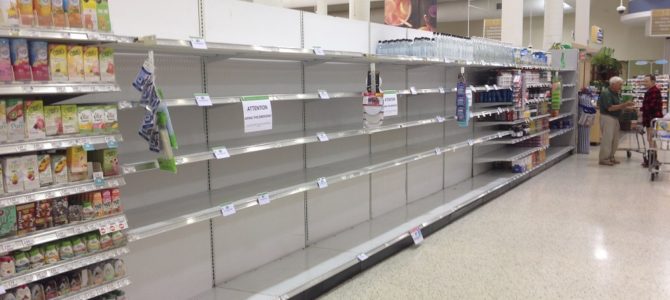
As Hurricane Florence barrels towards the Atlantic Coast, you may safely assume that the destruction in her wake will revive the debate over price gouging. After Hurricane Harvey last year, the Texas attorney general fielded more than 600 complaints of “price gouging.” The attorney general promised to prosecute “price gouging” as a crime. Texas law threatens price gougers with a fine of up to $20,000. If the victim is older than 65, the fines skyrocket to as high as $250,000.
It feels good to stick it to these vultures preying upon the victims of hurricanes and other natural disasters. Instead of rolling up their sleeves and donating their time and resources, they exploit the stricken community.
But the outrage at profit-seeking price gougers does not magically conjure critical supplies. When the volunteers do arrive, they’re often unskilled and further burden the fragile infrastructure. They also bring the wrong things: toys, extra clothes, and way, way, way too much bottled water. Meanwhile, shrieking outrage at the price-gougers on your television is no substitute for providing things that people actually need to buy.
It’s counterintuitive but axiomatic that to make goods cheap and dependably available, businesses must be allowed to charge the highest possible price for their goods and services. This automatically does three things.
First, it entices greater supply by attracting competitors in surrounding areas to shift their inventory into the high-demand area. When price gouging is legal, it creates an extremely lucrative entrepreneurial opportunity for suppliers to anticipate shortages before the first raindrop falls. Load some chainsaws and powdered milk into your truck in Kansas City, and you might just make a small fortune bringing essential supplies into Charlotte.
Second, it automatically rations the remaining stock until more can arrive. Sure, $10 might seem like too much to pay for a gallon of milk. But at least there’s milk to be had. Have you ever tried to buy milk and bread in advance of a blizzard? Legal price gouging minimizes interruptions in supply that can stoke the kind of desperation that leads to looting and lawlessness.
Legalized price gouging is the best defense against panic and looting in disaster zones. In areas struck by disaster, prices for critical items such as gasoline, food, and chainsaws often spike. While many people call this unfair, the alternative—no supplies at any price—is even worse.
Venezuela represents a very effective controlled experiment in what happens when the government attempts to make goods and services more affordable by outlawing price increases. When the Venezuelan government passed a “fair price” law controlling the prices of essential staples, the store owners simply stopped stocking those items, as they could no longer make a profit over the cost of importing them.
Keeping prices stable in the face of spiking demand and supply interruptions leads to dangerous shortages. Instead of overpriced food, people can’t find food at any price. You might grumble at having to pay high prices. But shortages turn disaster areas into looting zones as otherwise law-abiding citizens become desperate for essential supplies.
Michael Munger explained how anti-price gouging laws triggered such acute shortages after a 1996 hurricane in North Carolina.
One might think that thousands of entrepreneurs in the surrounding areas, little touched by the storm, would load trucks and head to the disaster area. After all, they owned, or could obtain, all the things that the residents of central North Carolina needed so desperately. Ice, chain saws, generators, lumber, tarps for covering gaping holes in roofs… we needed it all. I say ‘we’ because my family lived in North Raleigh. No power, and 36 large pine trees smashed down like God’s own pick-up-stix. We couldn’t get out of our immediate neighborhood, and my underpowered chain saw burned out on the first tree I tried to cut.
But no such mass movement of resources to their highest valued use took place. North Carolina had an ‘anti-gouging law,’ which made it illegal to sell anything useful at a price that was ‘unreasonably excessive under the circumstances.’ This had been widely interpreted to limit price increases to around 5% or less. Each instance of violation of this law could result in a fine of up to $5,000. So, ice that happened to be in Charlotte, stayed in Charlotte. Why drive three hours to Raleigh when you can only charge the Charlotte price, plus just enough for gas money to break even?
Market forces are an amazing thing. Without command from a governor, a bureaucrat, or a regulation, the invisible hand will immediately position vital supplies to minimize or even eliminate interruptions in supply. That’s how price works.
Price gougers are entrepreneurial heroes who instantaneously begin the relief and recovery process long before the wheels of the unwieldy juggernaut of government begin to turn. If you want to save lives and maintain order, let suppliers gouge away.









